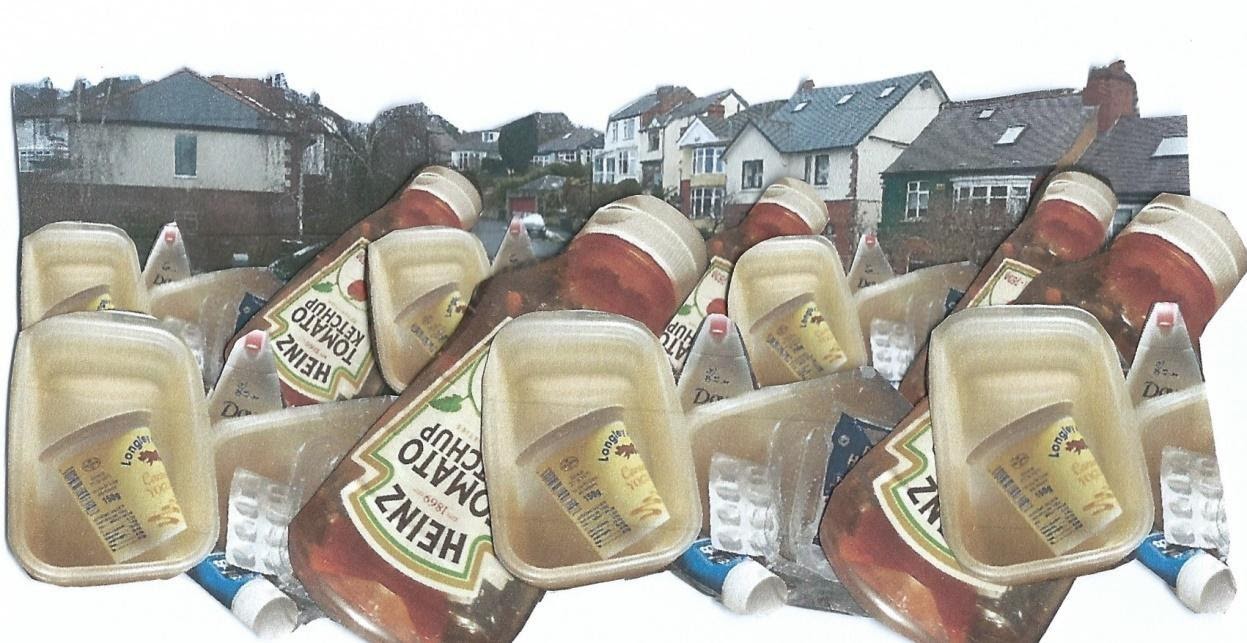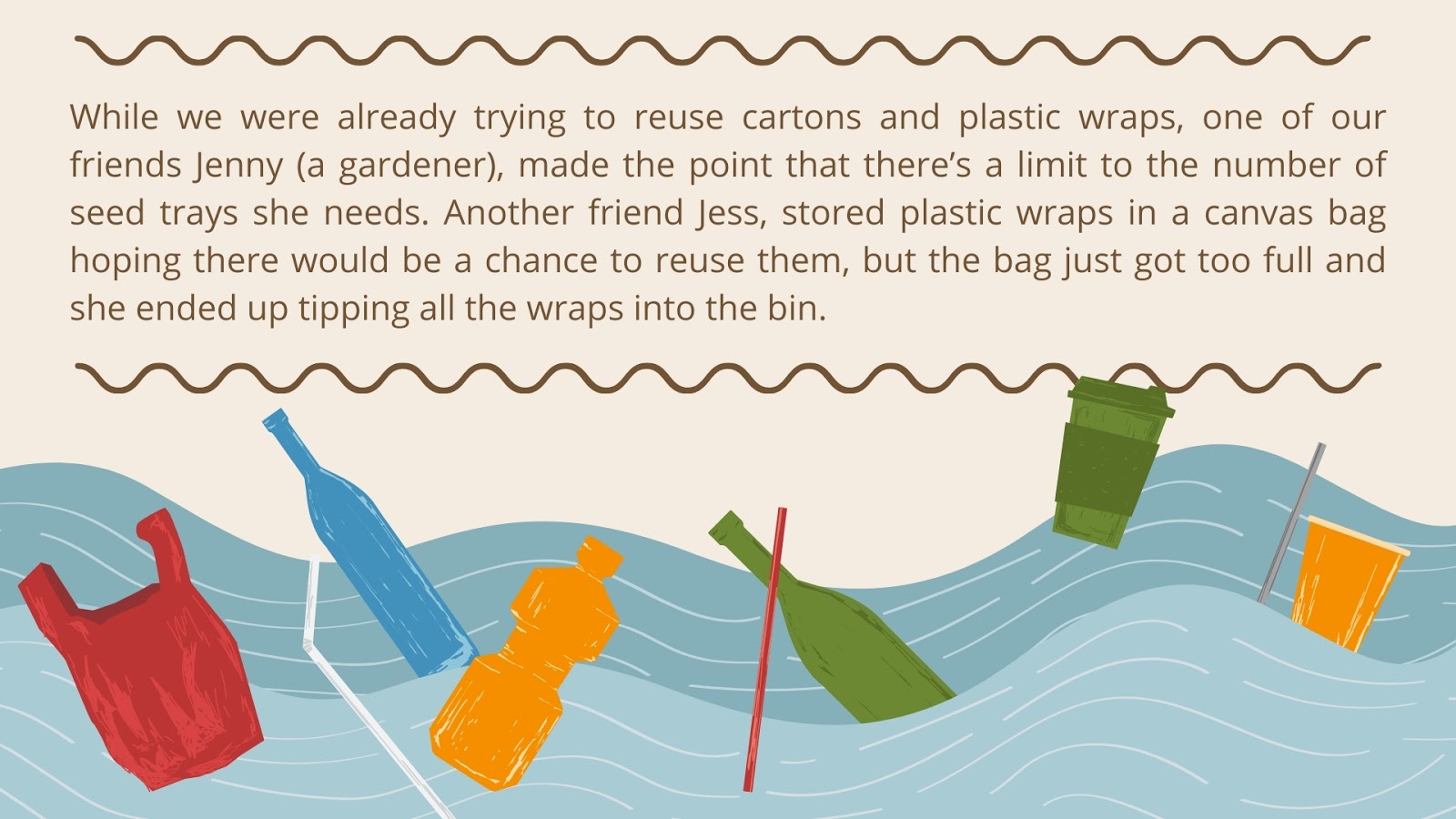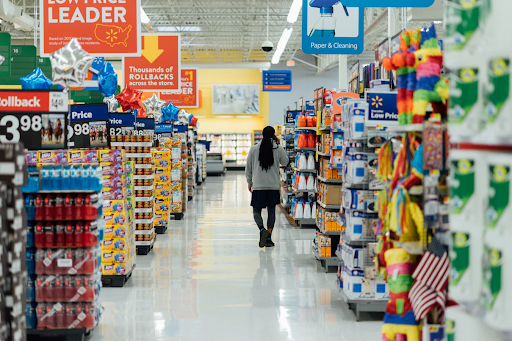Nine of us took part in a household audit of plastic waste. We were a group of neighbours and friends, many of us living alone or with one other person. All of us used supermarkets to do some of our shopping. We knew that plastic was damaging the environment and we’re trying -- in different degrees -- to reduce plastic in our own daily lives. While we were already trying to reuse cartons and plastic wraps, one of our friends Jenny (a gardener), made the point that there’s a limit to the number of seed trays she needs. Another friend Jess, stored plastic wraps in a canvas bag hoping there would be a chance to reuse them, but the bag just got too full and she ended up tipping all the wraps into the bin.
Feelings ranged from guilt to frustration and to anger. Guilt, because we were buying the stuff in the first place; frustration that we were stuck with all of it; anger that we were part of a system that made it hard to find affordable and easily accessible alternatives.
So we decided to volunteer for the #breakfreefromplastic’s brand audit. As we were counting the plastic items we were throwing away (or trying to recycle) we were really confronted by the scary quantity and types of plastic that surround us. So much of it can’t even be recycled (not that recycling is the answer!). We didn’t realise how many types of plastic there were. As for all those items that are made up of layers of different types of plastic that can’t be separated - unbelievable!
We collected 552 plastic items in our audit – that meant that more than 8 plastic items were being disposed of every single day by each of our small households. We were shocked!
Of the 552 items, 39% were supermarket-owned brand products.
We contacted those supermarkets to tell them and see their responses. We are still waiting to hear from two of them– after several emails have been sent. So much for customer service! The speediest and best response came from Aldi – the supermarket which featured well in the recent Environmental Investigation Agency and Greenpeace report. The report found that Aldi jumped from 9th place to 2nd in terms of their plastic footprint and their commitment to making further plastic reductions. In response to our email, they had a ready, customer-friendly reply which started disarmingly with, “It’s encouraging that our customers are as passionate as we are about reducing our impact on the environment!” But their answer covered many of the bases – Specific targets that were also Measurable, Achievable, Realistic, and Time-limited. Positive thinking has gone on somewhere.
Remove, Reduce, Reuse, Recycle featured in the response from Tesco. Can’t argue with that!
But all the supermarkets need to ‘walk the walk!’ They should be the ones feeling guilty and not us.
As one friend Josie from the group noted, supermarkets are likely to be driven by market forces rather than a desire to save the planet. Thank goodness that market forces are becoming more vocal! For another friend Connie, the change can’t come soon enough; she’s stopped buying yoghurt because of the useless plastic pots (she said that one day she may learn to make yogurt but she shouldn’t have to. It can’t be so hard to provide reusable pots!). Tina, who is also from our group, has stopped buying pump hand-wash in containers because she realised she was using so many of them. She has bought a Beginners’ Guide to making soaps and may also embark on making bars of shampoo. Now that is impressive!
In different ways, this whole experience has changed our group, and now we are all doing more to support firms that are reducing plastic packaging. We are using ‘refill it’ local shops. We are shopping less for fruit and veg in the supermarkets and going to independent shops that pack apples in paper. One of the friends Chris, is even exploring other options like The Good Club who deliver a range of products and take away empty containers for reuse.
We are lucky. We are in the position to make some good choices – often more expensive in the short term, but so, so important. We need to continue to vote with our feet. We need those with the power – the supermarkets – and the government – to take responsibility and make it easier for everyone to live in a world where plastic is not seen as a cheap and cheerful disposable wrap.







